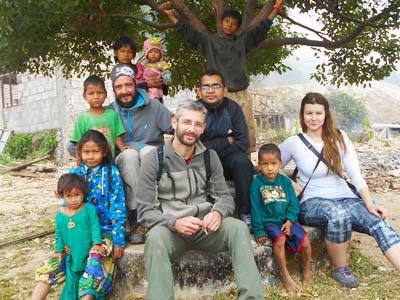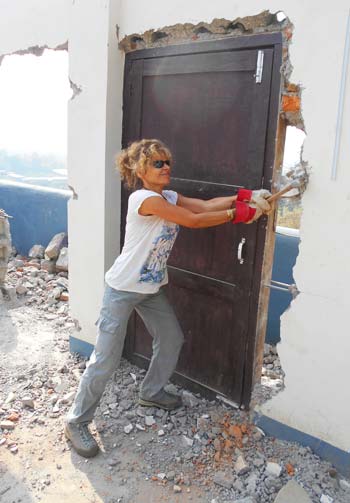|
 After reading the Sunday paper yesterday, I started to see a trend. Talk of the need to get away. Two articles struck me: one in the business section about "adult gap years" and the other in the travel section about going to a Greek island "famous for being unfamous". Their shared theme was the need to break the mold of day-to-day life. The articles were geared to working people, working year after year without truly getting away. How many of us take "working holidays." In the internet age, it has become nearly impossible to leave work behind. Do you ever travel without a laptop or smartphone? Do you keep in touch with what's happening at work? Going abroad used to forceably separate us from our work and our home. You'd send a few postcards. No email, no CNN International, phone calls were too expensive. After reading the Sunday paper yesterday, I started to see a trend. Talk of the need to get away. Two articles struck me: one in the business section about "adult gap years" and the other in the travel section about going to a Greek island "famous for being unfamous". Their shared theme was the need to break the mold of day-to-day life. The articles were geared to working people, working year after year without truly getting away. How many of us take "working holidays." In the internet age, it has become nearly impossible to leave work behind. Do you ever travel without a laptop or smartphone? Do you keep in touch with what's happening at work? Going abroad used to forceably separate us from our work and our home. You'd send a few postcards. No email, no CNN International, phone calls were too expensive.
The "gap year" article speaks of the benefits of doing something completely unrelated to career - for example a medical doctor interning in construction. Of course, there are obstacles to getting away from work: loss of income, jobs that don't offer sabbaticals, family obligations. Still, over the years, we've seen many people at ELI who have found a way to do it. People who set out to see the world, sometimes for a full year! There have been some crazy itineraries - 3 months in Nepal, 1 in Cambodia and then over to Kenya for a few more. They'll supplement their ELI programs with travels in between. Why go from A to C without seeing B?
 Some of these travelers are able to return to their jobs, others don't have that option and need to quit. One group the article discusses is people who choose a gap year as a way to enter retirement. After all, retirement doesn't necessarily mean inactivity. We know that retiring "boomers" are much more physically active and generally healthier than previous generations. I spoke with a woman last week who just retired as a judge. Now she was finishing a master's degree in public health. She's interested in working with "right to health" issues in Africa, and was checking into our programs. Retire? Not when there are so many interesting possibilities out there. Time to see the world, and put that life experience to work in new ways! Some of these travelers are able to return to their jobs, others don't have that option and need to quit. One group the article discusses is people who choose a gap year as a way to enter retirement. After all, retirement doesn't necessarily mean inactivity. We know that retiring "boomers" are much more physically active and generally healthier than previous generations. I spoke with a woman last week who just retired as a judge. Now she was finishing a master's degree in public health. She's interested in working with "right to health" issues in Africa, and was checking into our programs. Retire? Not when there are so many interesting possibilities out there. Time to see the world, and put that life experience to work in new ways!
The other article by novelist/poet Alexander Chee also talked about changing gears and putting aside his work. He accepts a friend's invitation to visit her and other friends on a lesser-known Greek Island, Sifnos, for a month. Frankly, I knew nothing of Sifnos. Apparently it is a great culinary destination, but still is not among the must-see locations for most people. Being off the beaten track appealed to the author. He decided to make use of the trip to get away from writing (the article was written after the fact). Instead he spent his mornings visiting different beaches around the island, sketch pad in hand, reviving a past interest in drawing. In the afternoon he'd head back to town to enjoy the company of his friends. What can I say? It's one of those articles that sends you immediately to a map and to TripAdvisor.
Anyway, Mr. Chee points out something we all know. We simply don't know how to let go. Taking a true vacation requires more than making a reservation. Force a more complete break from day-to-day life. Make sure you are doing something different. I particularly like the way he sets out to thoroughly explore the island. I've always felt it is better to know a single place well than to have a cursory knowledge of many. He wasn't concerned with seeing other islands. Travel should be more than a "been there, done that" list.
His closing words sum up what he has learned by this break:
Vacation is so often cast as a luxury now in America, a bourgeois game of Instagram tagging and food photos. But for me, in Sifnos, I came to know it as the time in the year when you find not only rest, but also the strength you need to meet your work and your life when you return to them. In the years since, it’s been hard to be an American writer and take vacations like this. But I would never want to live the other way — without them — again.
Give it a read!
|